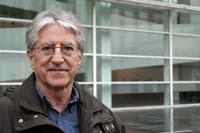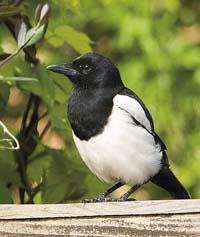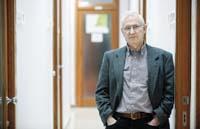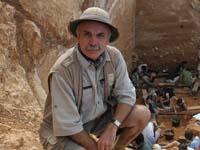Filosofatzen: zenbat buru, hainbat aburu

According to Jesus Mosterín, the person does not distinguish himself from any other animal. Mosterín is a research professor at the CSIC Institute of Philosophy and professor of Logic and Philosophy of Science at the University of Barcelona. In his opinion, people are animals, so it makes no sense to ask ourselves what sets us apart from them. Clarify this with a difficult example to return: "It's like someone who asks you: Is it possible? The answer is nothing, because the Basques are women." The answer is “nothing”, because the Basque women are women).
However, Mosterín does not deny that animal species, including people, are different from each other: "It is evident that mosquitoes are very different from elephants and they from eagles and eagles from cucarachos. But all animals have common characteristics and everything that can be said about them can be said about our species. And it is that we are all related, in evolution we have had the same ancestor, and the less generation they have to do the two species, the closer they will be their relatives".
Thus, the human species has characteristics that do not have the others: it walks on two feet, has capacity to speak, creates and uses technology, has capacity of abstract thought... However, Mosterín considers that these characteristics are not determinant for their differentiation as a species. "Bees make honey and spiders nets. That is, as we have our peculiarities, the other species have theirs, but the species are not distinguished by them. In fact, reproduction distinguishes species: if two populations are able to cross and reproduce each other, they belong to the same species. And it is."
It also offers examples such as dogs and wolves of the same species, which can cross each other and have offspring. "But even though I fall in love with a wolf, I cannot have offspring with him. And this is not because of the language, technology and other issues that are cited, but because we cannot multiply it. In addition, at the core of the species definition is the possibility of crossing and reproducing it."

Those who say they are our
Other characteristics that characterize the person of the other species do not seem decisive at all. For example, contrary to what other philosophers have said, for Mosterín it is not true that we have a specific consciousness of self, because it is shown that other animals also have self-awareness. "This is confirmed by the mirror experiment. In this experiment, an animal is placed in front of the mirror and previously a spot is placed on the forehead, for example. If the animal tries to clean the stain, it means it has been known."
The researchers have conducted the experiment mentioned by Mosterín with many species and there is no doubt that chimpanzees and many other primates are known, that is, they are aware of the self. In addition to primates, other species have shown this ability, such as mica.
Mosterín shares his opinion on the consciousness of death. In fact, it has often been said that the only species that realizes its mortality is ours. Mosterín denies it and exemplifies the elephants: "Elephants have an obvious awareness of death. When they are in a situation of extreme gravity, for example, when a drought hits another place and one of the groups dies, the others wait and stay a few days taking care of it. Before leaving the deceased they cover it with leaves and soil. And if they pass from there again, they remove the sheets to confirm that he is a lost friend."

On the other hand, the existence of religions or beliefs is considered by many the specificity of our species. In that sense, Mosterín thinks otherwise. According to him, people have ideas and thanks to the ability to speak and write we have an enormous capacity to convey those ideas. "These ideas can be good or bad. Another example: Number 13. One can say that 13 is the first and that is true and can be demonstrated. Another may say that 13 is of bad baba and that is wrong. But, although it is wrong, it can be said that then it is transmitted and so in the United States there are houses that do not have plant 13 or hotels without room 13".
He believes the same thing happens with religions. He explains that there are many religions, each with their myths, their ideas, and some with things that are contradictory to each other, and within each group they perpetuate and transmit them. Mosterín recognizes that many people are in one of these groups, but does not recognize the specificity of the species: "There are many people who think that the 13th is bad nose, but many do not believe it. So with religions, the same. Some are Christians, Muslims or animist religion and others are atheists."
Within our species there is a great variety of beliefs, which, according to Mosterín, shows that no belief is specific to the species: "Because when something is part of the person's nature, it is common for everyone, like walking two feet and having a language or lungs. On the contrary, religions are not everyone's."
Special and main

Other philosophers have a very different view of the subject. Álvaro Moreno is professor of philosophy of science at the UPV-EHU and states that "there is no doubt that people and animals are different, we are totally different." Among the characteristics that characterize us, Moreno mentions civilization, culture, the speed of our evolution --not only linked to biology or genetics -, language, brain development and mastery of other species. However, it is difficult to choose among the most special: "There are many who interact with each other, so it's not easy to say which is the most special, the most specific."
According to Moreno, rationality was the core of our species for Greek philosophers. "But what does it mean to be rational? It is not clear. They talked about the ability to make a reasoned speech and a language is needed. And what exactly does it mean with language? Many other animals also have communication skills, but only we have the language. In addition, within our species, the language has evolved, evolved, for example, the creation of writing is a milestone. On the other hand, is language cause or consequence of brain development?"
In addition to language, Moreno believes that the ability to generate technology and the ability to develop other technological tools with this technology is also the same. Thanks to this technology we have changed our relationships and have been able to adapt the world to our interests. This has brought consequences, "this and the ways of understanding our domain."
In fact, Moreno has no doubt that we are more powerful than other species, but believes that we have not made intelligent use of this power. For example, we have broken the balance between ecosystems and now learning to value biodiversity can be a matter of humility, but above all consciousness. It considers it essential to be aware of the importance of biodiversity conservation. You don't think it's easy to make global decisions to move forward in a smart direction in the future. "I don't want to be pessimistic, but it's hard to be optimistic."

Are we not yet human beings?
Archaeologist, anthropologist and paleontologist Eudald Carbonell has also delved into the subject and found other answers. Among other things, it claims that we are not yet human beings, people. He explains that becoming a person is an evolutionary process, still underway, in which biological and cultural aspects influence. When cultural evolution prevails over biological evolution, then the humanization process will take place.
For Carbonell, as for Morenor, the person is different from the other animals. "In this there are key factors such as the socialization of technology, language, knowledge and thought. In fact, socialized technology and the language associated with this process foster self-awareness. At the same time, the tractor consciousness, that is, the consciousness of the mind and the species, makes us human."
Carbonell also has an interesting vision of the future of the species. According to him, our species is experiencing convergent exponential growth, and it is foreseeable that the increase and complexity of social relations lead to collapse. "Every time our species implants a new system, it must metabolize change. After the scientific and technical revolution it has not yet done so, but it can cause the collapse of the species. This can happen in this century."
It also predicts the consequences of collapse: "Then our species will socialize in another way, it will be the eve of transhumanization."
It is clear that the issue seems something to think about...





